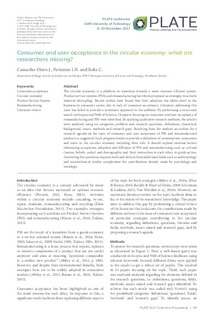Consumer and user acceptance in the circular economy: what are researchers missing?
Chapter
Published version
Permanent lenke
http://hdl.handle.net/11250/2478263Utgivelsesdato
2017Metadata
Vis full innførselSamlinger
- Institutt for design [1122]
- Publikasjoner fra CRIStin - NTNU [38043]
Originalversjon
Product Lifetimes And The Environment, PLATE 2017 - Conference Proceedings 10.3233/978-1-61499-820-4-65Sammendrag
The circular economy is a platform to transition towards a more resource efficient system. Product service systems (PSS) and remanufacturing have been proposed as strategies to achieve material decoupling. Recent studies have found that their adoption has fallen short in the business-to-consumer sector, due to lack of consumer acceptance. Literature addressing this issue has failed to provide a systematic approach to the problem. By performing a structured search on Scopus and Web of Science, 24 papers focusing on consumer and user acceptance of remanufacturing and PSS were identified. By applying qualitative research methods, the articles were analysed using six categories: problem and research questions, definitions, theoretical background, issues, methods and research gaps. Resulting from the analysis an outline for a research agenda on the topic of consumer and user acceptance of PSS and remanufactured products is suggested. Such program needs to provide a definition of consumption, consumers and users in the circular economy including their role. It should explore external factors influencing acceptance, adoption and diffusion of PSS and remanufacturing such as cultural (norms, beliefs, codes) and demographic and their interaction to each other, to guide action. Answering this questions requires tools and devices from additional fields such as anthropology and sociotechnical studies complement the contributions already made by psychology and sociology.

